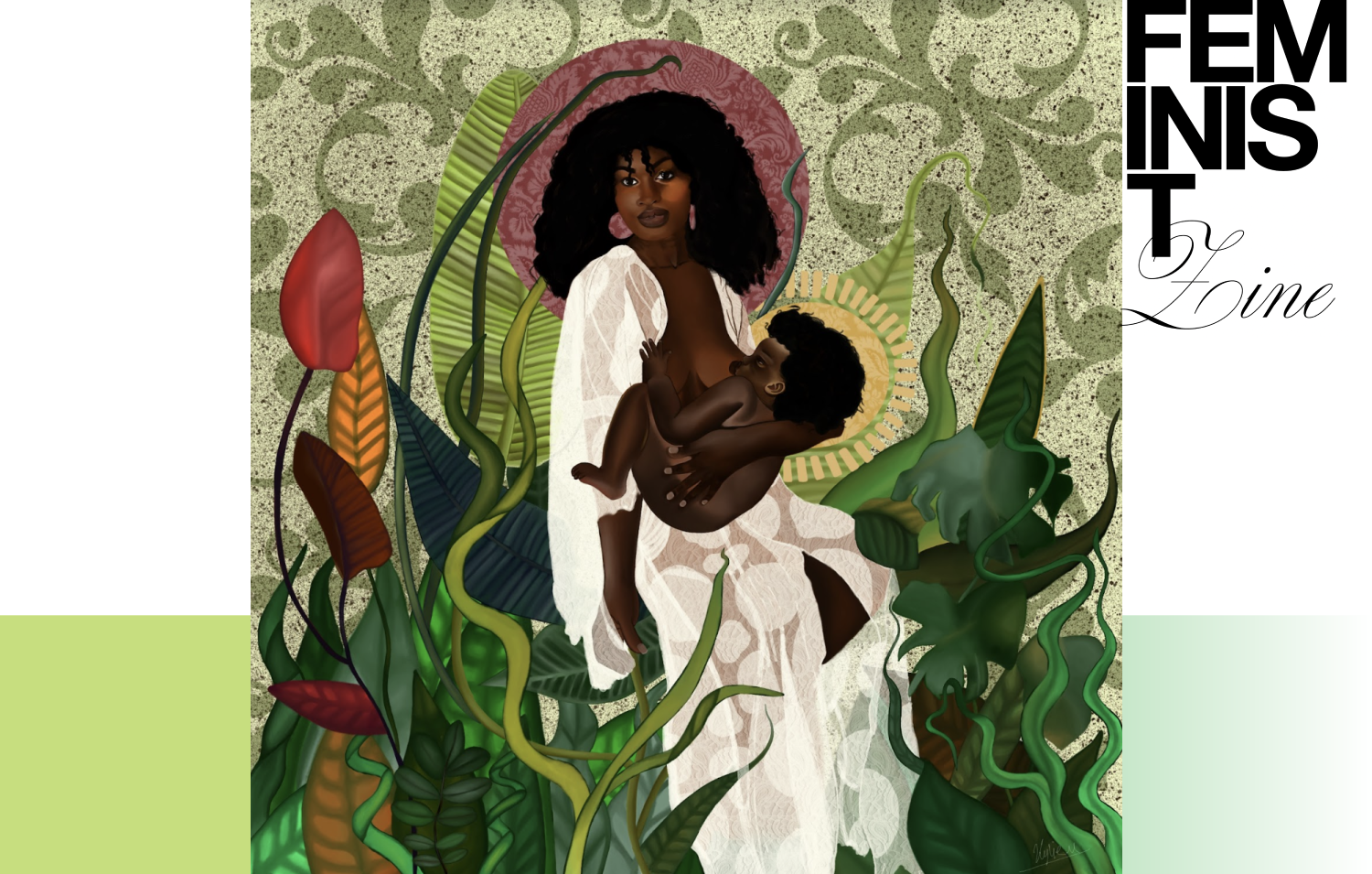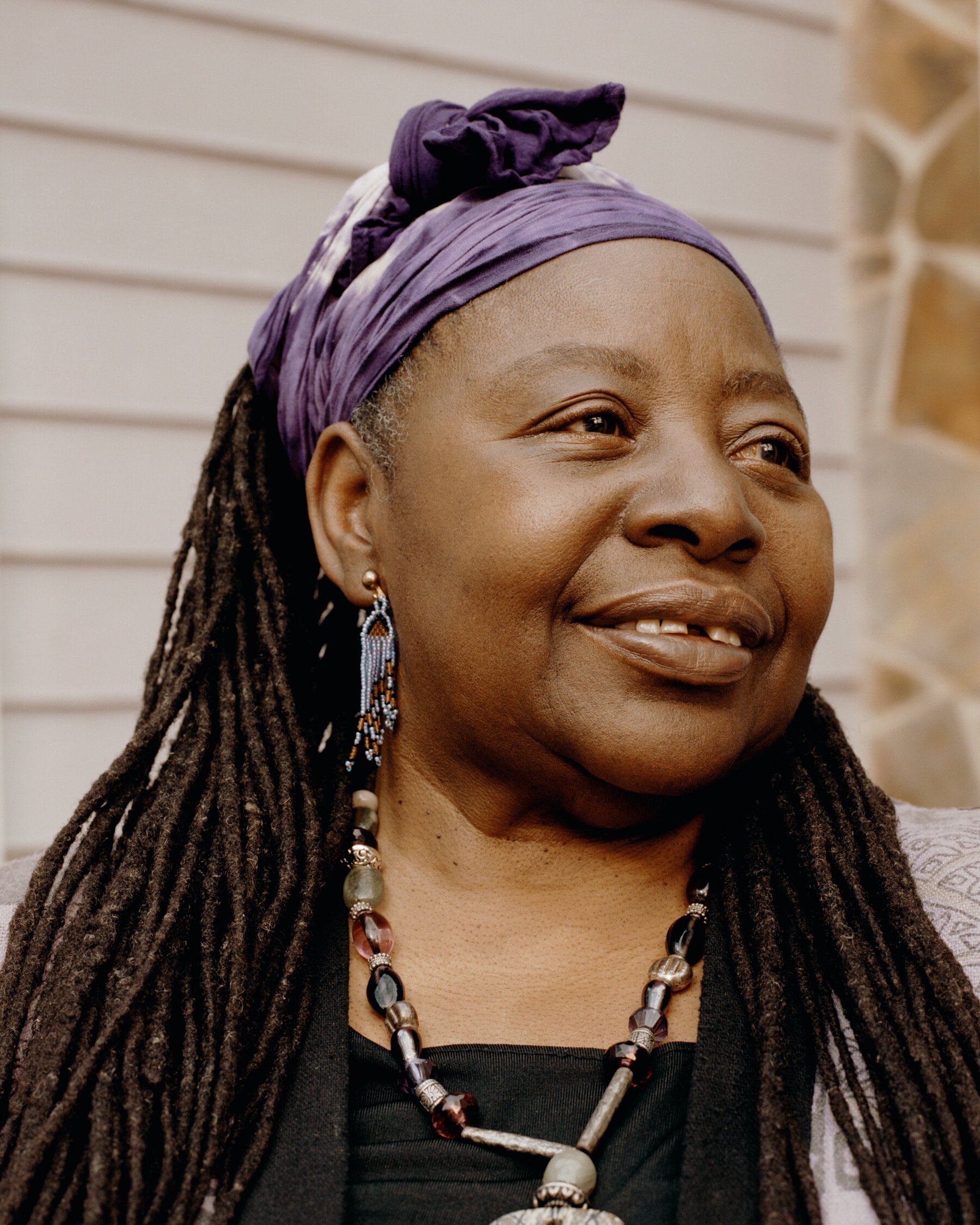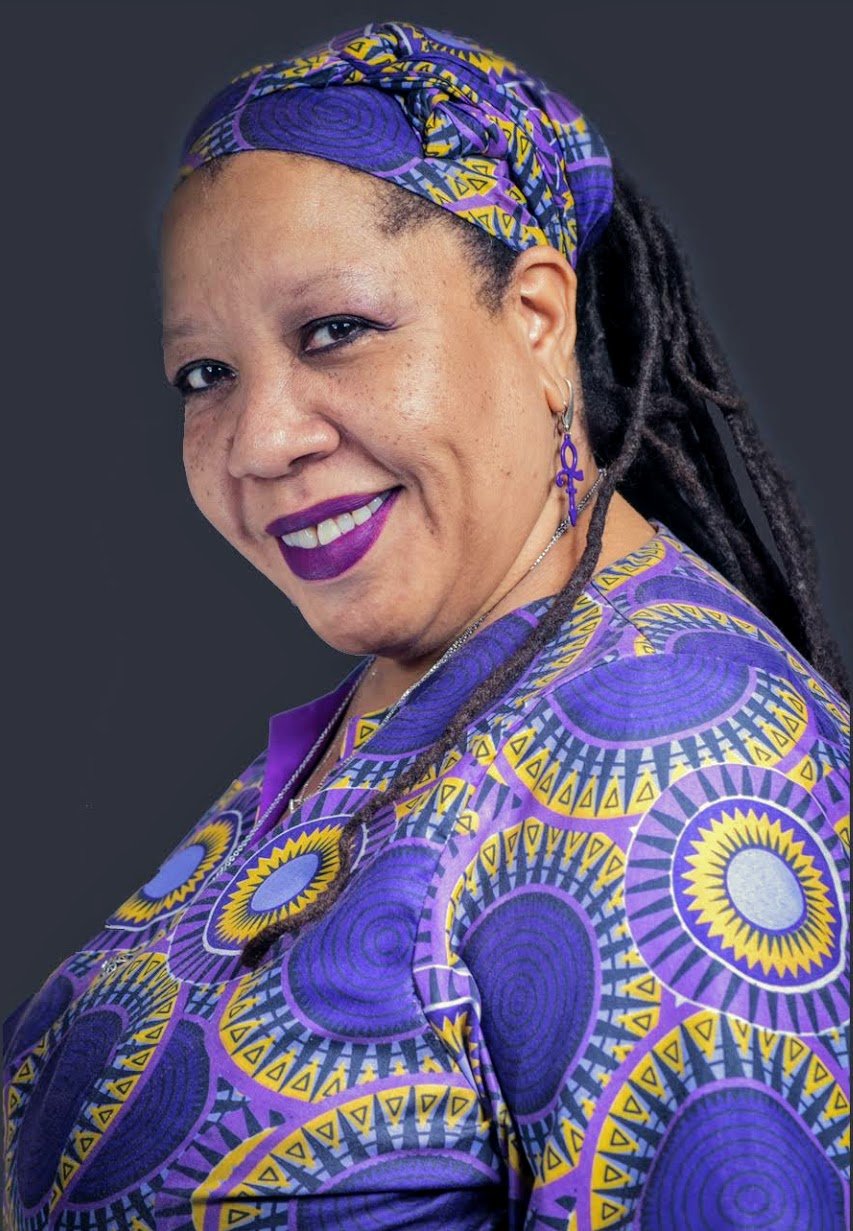On Black Feminism and Reproductive Justice with Loretta J Ross and Dázon Dixon Diallo
by Aisha Becker - Burrowes
Read this in the FEMINIST ZINE
Loretta J Ross and Dázon Dixon Diallo are reproductive justice and human rights activists and co-founders of SisterSong, an organization dedicated to reproductive justice for women of color. Diallo is also the Founder and President of Sister Love, the oldest women-centered HIV and sexual and reproductive justice advocacy organization in Atlanta and the Southeast. Ross and Diallo sat down with FEMINIST co-founder Aisha Becker-Burrowes to reflect on what feminism means to them.
Aisha: So the first question I have for you is, how does Black feminism inform your advocacy?
Loretta: Black feminism is my theory of change. It’s who I am, but I have to honestly say I didn’t use the "f-word" for myself for a long time.
Aisha: Me neither.
Loretta: Because I thought feminism was a white women’s thing. And so I had been a practicing feminist before I would use the "f-word" for like a decade, because I was in the early anti-rape movement.Bbut I used to say, “I’m not a feminist, but…” [Loretta laughs] You know? That always preceded me denouncing feminism.
Aisha: Mhm.
Loretta: But when I got the job at TNOW — The National Organization for Women — then I felt like a fraud. How could I work at the largest feminist organization in America and not use the "f-word" myself? So I had to own the “f-word” and repurpose it through a Black feminist lens, and now I call myself a justice feminist.
Aisha: I love that.
Loretta: Because I believe in the alignment of reproductive justice, racial justice, health justice, and environmental justice. I just think there’s this wonderful alignment that’s taking place and it’s very feminist.
Aisha: You said “a justice feminist.”
Loretta: Yeah.
Aisha: Wow. I love that.
Loretta: As a matter of fact, I was a part of the generation that had to decide whether to use “womanism” versus “feminism” … and I just felt like “feminism” was more authentic to me. “Womanism” felt like trying to avoid saying the “f-word”.
Aisha: Mhm.
Loretta: And so I embraced the “f-word” totally, even though I don’t always mean “feminism” when I use an “f-word” –
Loretta: But still, [Loretta laughs] I’m talking about the better one.
Aisha: I relate to that, I just want to let you know. [Aisha laughs] You have been working on reproductive justice through the lens of, what I’ve heard you say, reproductive futurism. Why does that feel so critical to you right now?
Loretta: Well, I was one of twelve Black women who co-created the theory of reproductive justice in 1994, and we’re really proud of not only the work, and the creativity, and that theory of change we created, but the way it’s just proliferated globally. Often without our knowledge, because of like — it just became such an attractive framework. But lately, I’ve been most preoccupied with reproductive technologies that are promising kind of a “techno-utopia,” and I really wonder whether or not our present social inequalities will be upgraded using reproductive technologies. So I’ve been talking a lot and writing more about reproductive futurism, which is a reproductive justice analysis of reproductive technologies. Because I could ask a basic question: when talking about “designer babies” do you imagine any of those will be Black?
Aisha: Mmmm.
Loretta: And that’s it in a nutshell.
Aisha: Mhm. In this fight for bodily autonomy, how does that framework feel especially critical right now? In addition to my earlier question.
Loretta: Well, reproductive justice is a human rights based framework. And so we demand the achievement of full human rights, not only to protect the right to have a child, or not to have a child, and to raise your children, and to express your gender identity, and all of that, but we’re up against a real — I don’t even want to call it a resurgence — of neo-fascism and authoritarianism across the globe. And I believe human rights is the best antidote to fascism. And, matter of fact, the whole Universal Declaration of Human Rights was put together as an answer to the genocide that Nazi Germany had committed against Jews, and “gypsies”, and communists, and anybody else they didn’t like. People of color, people who were disabled, you know, on and on. And so, at this particular moment, I believe that the human rights framework is even more important than it’s ever been, because right now there are no limits on what people are willing to do to each other. You know, we’re dealing with forces that are willing to lie because lying is their only strategy. Manipulating people is their only strategy. Yet we’re watching our children get killed in schools instead of going to college; we’re watching people, you know, not have enough to eat; we’re watching corporations make insane amounts of profits, even as we’re dealing with all kinds of global shortages of food, and fuel, and all of these other things. So right now, I think that Black feminism — going back to your original question — offers the best hope for the future of humanity. As my friends have all said: Life began in Africa. We’re not your problem. We’re your solution.
Aisha: Mmm.
Blair: [whispered] Period.
Aisha: So, as a co-founder of Sister Song –
Dr. Diallo: Mhm
Aisha: – I’m curious what are some of the pillars that you all are working on right now in this current moment?
Dr. Diallo: Sure, well – so, when I came in as a part of Sister Song – and I’ve been a part of – Loretta and I, that’s a whole thing, a Loretta and Dr. Diallo thing have been a thing for a very long time. Partners in change. And the way I entered with the conversation with Sister Song was because with my work in sexual health, and sexual health rights and justice, there wasn’t a lot of space, even in reproductive health rights for that. And, so one of the key elements for us was making sure that issues of HIV, for example, which were not also a part of the reproductive rights movement, were a part of what we were now claiming as the reproductive justice movement. So I think what’s important in terms of the current pillars, where we’re moving, Sister Song and my organization Sister Love, is taking intersectionality from a “what” to a “how”. Right? The intersectionality is the things, it’s the identities, it’s the oppressions that we name, but it’s how we tackle the issues that also have to be intersectional. The way I think about it is, people walk with intersectional experiences every day, intersectional challenges every day. But everything responding to them, even our movements, are all very siloed.
Aisha: Mhm.
Dr. Diallo: So if you’re gonna have a real movement for people who are living intersectional lives, you must have intersectional responses. That means service delivery, along with advocacy and policy, along with research, along with the writing, along with the teaching, along with the marching and the real hardcore activism as well. And then, you have to make sure that you’re doing it in a way that builds the solidarity that’s needed to affect any and all of the experiences that people have. So, one of the other pillars for me in this movement is – and I’ll just follow on with Loretta – I think that what’s really important in all of this is helping people understand what it means to center. Centering is truly about shifting power and privilege. It’s about taking everybody from those margins and moving them to the center like Congresswoman Ayanna Pressley says best, right? “The people closest to the pain must be the people closest to the power.” So I think what Sister Song, Sister Love, all of the folks that we know in the Black reproductive justice work, across this country, are really honing in on what it means to not just trust Black women, but follow Black women, believe in Black women, listen to Black women. And as a lot of us say, when you take care of us, or when we take care of ourselves, it actually helps – it absolutely helps everybody. We are the rising tide, and everybody else — boats — lift because of that. And now Loretta was talking about “shepatriation” — I have this whole next level thought of the power that we wield absolutely comes from our origins. And we are so far — WE — are so far removed from that power, from that identity, from that crucial place of understanding that no other human would be here if we didn’t exist, right? And if we can recognize that, and own that, and move with that, then we can change a whole lot more than we even believe we can change now. We know we’re doing some stuff. But when we know what we have already done, and what everybody else needs – And you know what’s challenging about that? Is I’ve got so many sisters who are like, “I am so sick and tired of having us to be the ones.” As Loretta talks about, you know, we’re the cleanup people, we’re the cleanup women. There’s – They don’t want to be held to that level of being responsible for everybody else’s foolishness – And that’s exactly what every Black mama says about all her children.
Dr. Diallo: Right? Even if she doesn’t want to be the person, right? It’s still because it is absolutely our place. It’s our place. And I think that we have to regain that place, to know our true power. So one of the things I absolutely believe is that the continent of Africa is where life begins, is where all the resources on the planet come from, it’s why everybody wants a piece of it, it’s why everybody is stealing from it, overtaking it. I think that the fact that most of the continent is run by men who are hypermasculine and patriarchal is why people are allowed to come and take it. I truly believe that the next level, that Black feminism, that Afro-feminism, that reproductive justice, that justice feminism leads us to, is that there has to be a lot more — [emphatically] a lot more — solidarity building, unifying, collective work, collective action, of women on the continent, and women of African descent living everywhere across this planet to recognize what our commonalities are and where our difference are and how to do the work we need to do around all of it.
Dr. Diallo: …[on it] for a while, figuratively, literally, however it works, in ways that we find those few issues that affect every single one of us and if we can make a dent on that, then we can change the world for everybody.
Aisha: I mean, it sounds like intersectionality — intersectional solidarity building. Right?
Dr. Diallo: Absolutely!
Aisha: Yeah.
Dr. Diallo: We have an initiative that we call “Women Now,” which is about the intersections of sexual reproductive health rights and justice in women and girls of African descent worldwide. And we’re listening to women and girls in South and Central America, and it does — the language is what makes it different. The lived experience and the stories are the same. And so, being able to find gender-based violence issues, and how different folks are responding to them, resolving them, or fighting to resolve them in different areas. Issues around gender identity, sexual identity, around safety and security, around sexual pleasure! Hell! We’ve got to have more conversations about not just sexual health and wellbeing, but sexual pleasure as well because it is a part of that expression and that joy that makes us whole! And so, as long as we’re still piecemealing things, we’re not gonna get there, and so I think you’re right. It is the intersectional solidarity, and, and, it’s the fact that we already — I know the young people talk about “we have receipts” — well I say we have the stories. We have all the stories. We just don’t all know them, and we don’t all share them, and we don’t all tell them. And so these are the conversations that have to keep happening. What just happened with Loretta and Constance [Wu] have to keep happening. We just had a whole weekend where women living with HIV for more than twenty years put together their own institute, right? With each other, for each other, about each other, to get the stories that they need to effect the change that they want to see. So I just think that there’s a whole lot more of us to do, outside of the theoretical space, go into the practical: What do you need, how do you need it, and how about understanding how the people who make decisions about your life are affecting those needs that you have, and how about you deciding to be one of those people making those decisions, and what do you need from us to help you get there? And that’s how we get there together.




